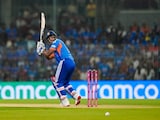- Astronaut Shubhanshu Shukla conducted a zero-gravity water experiment aboard the ISS
- Axiom-4 mission crew included Shukla, Peggy Whitson, Slawosz Uznanski-Wisniewski, and Tibor Kapu
- The mission lasted 18 days, combining scientific research with education and outreach
Astronaut Shubhanshu Shukla, the Axiom-4 mission pilot, has showcased a zero-gravity experiment aboard the International Space Station (ISS) involving water to illustrate how microgravity transforms everyday physics.
The experiment, part of Axiom Space's outreach and scientific mission, highlighted the unique behaviour of water in space.
After an 18-day stay at the ISS, Mr Shukla and three others -- commander Peggy Whitson and mission specialists Slawosz Uznanski-Wisniewski of Poland and Tibor Kapu of Hungary -- of the commercial Axiom-4 mission set off on a return journey to Earth on Monday evening.
Using surface tension to their advantage, Mr Shukla formed a floating water bubble. "I've become a water bender here in the station," he joked.
Another astronaut Whitson further went on to press a plastic bag gently into the sphere, demonstrating how surface tension behaves like a magnet in microgravity by clinging to the object and distorting light like a lens.
The astronauts also spoke about the opportunity not just to engage in science but also to communicate the wonder and beauty of Earth from space.
"I try to savour every moment I get -- just sitting by the window and looking down. It's the most beautiful view I've seen," Shukla said onboard the ISS.
Whitson explained that the crew is nearing the end of their two-week mission, during which they've balanced rigorous scientific research with education and public engagement.
Their mission has also included outreach to students and STEM communities around the globe, including in India, Hungary, and Poland.
Asked about re-entering Earth's gravity, Whitson was frank: "From me having experienced it, I know first person -- it sucks. Gravity really does." Shukla, on his maiden spaceflight, said he hopes to handle the descent better than his ascent, which involved some space motion sickness.
In the 10 minutes of their broadcast, the astronauts estimated they had travelled about 2,900 miles.
The Axiom-4 mission began its space odyssey on June 25 when the Falcon-9 rocket carrying the Dragon space capsule blasted off from Florida towards the ISS.
(Except for the headline, this story has not been edited by NDTV staff and is published from a syndicated feed.)















